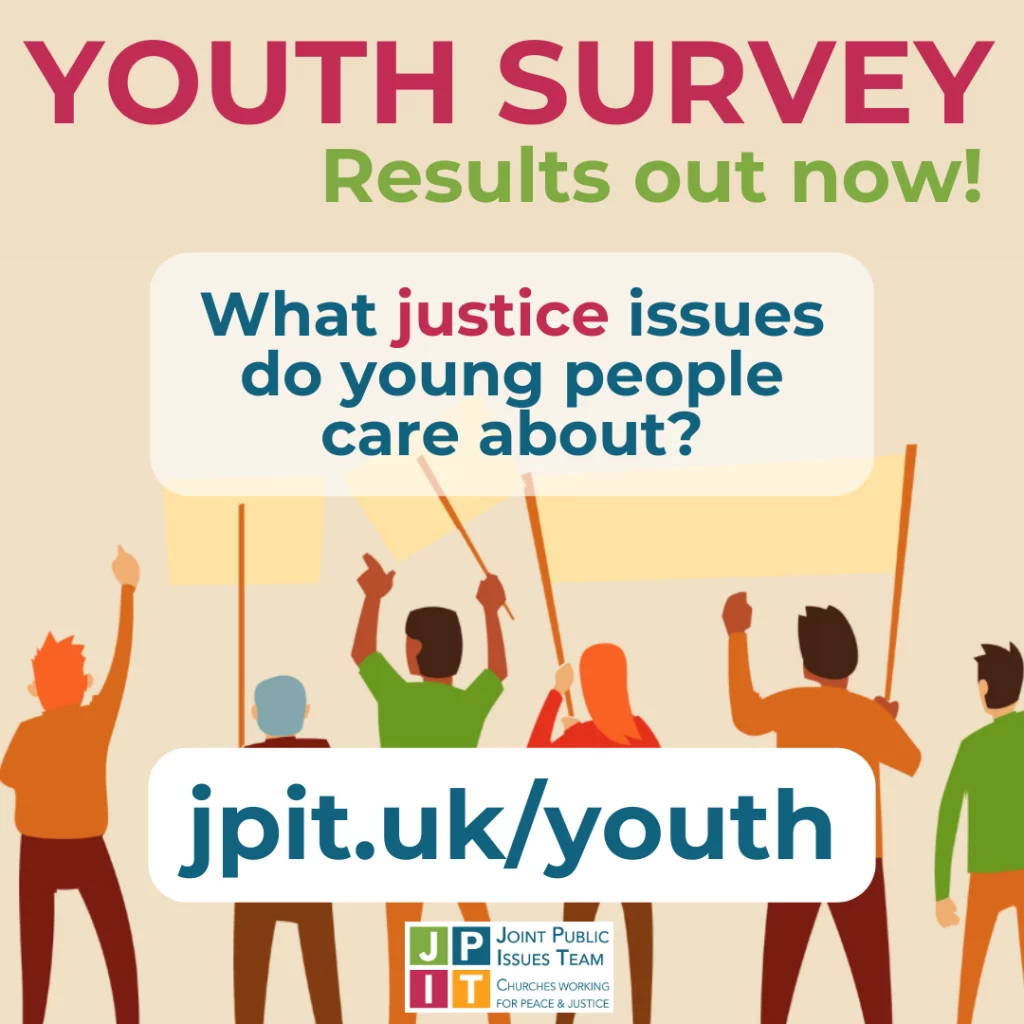In January 2024, we carried out a questionnaire asking young people what justice issues they cared about. We received almost 100 responses to our three surveys. Some respondents were under 15, some were 15-25 and others were youth leaders, parents, church leaders or others who work with young people.

What were the headlines?

The top three issues that young people were concerned about were:
- War and violence
- Climate change
- Cost of living and poverty
![Graph showing results from the question: ‘People often have more difficult lives because of these. Choose 2 or 3 that are most important to you:’
Under 15s, 36 individuals responded
Different kinds of families and relationships: 2 (5.6%)
Disability: 5 (13.9%)
Transgender, non-binary or intersex people: 7 (19.4%)
Bullying (online or in person): 12 (33.3%)
Having less money [poverty]: 19 (52.8%)
Racism: 20 (55.6%)
Wars: 25 (69.4%)](https://jpit.uk/wp-content/uploads/2024/04/6-e1712160103848.png)
Main takeaways from under-15s
The top issues that under 15s care about were:
- Wars
- Racism
- Climate Change
- Poverty
A common response when asked how to make life better for everybody, was to ‘love’ and ‘be nice’. These are good foundations from which to go deeper into issues of injustice. Other young people thought that more listening, acceptance of peoples’ differences and education would help.
Let everyone know they are loved and equal.
Be nicer to people regardless of who they are or what characteristics they have.
Main takeaways from 15-25s

We split the questions into global issues, local issues and personal issues.
Globally, young people are most concerned about war and violence.
Locally, young people are most concerned about drug and alcohol abuse.
Personally, young people are most concerned about the cost of living, worrying about issues of jobs, money and housing.

We also asked if they had experienced unfair treatment because of any of their characteristics. Many responders had. The most common response, from nearly half of those aged 15-25, was that they had been treated unfairly because they are neurodiverse. Other respondents felt they had received unfair treatment because of their sexuality or their age.
Listen to each other – at all levels.
Educate people properly on ways to deal with these situations and have ways to help those who don’t understand it.

Responses included issues around mental health, wellbeing and happiness, with deeply worrying concerns about ‘never being happy’ and ‘finding a reason to keep living’. We would encourage anybody who works with children and young people to keep an eye on wellbeing and mental health, and pastorally support and care for young people. Seek advice and support from experts in the field and from safeguarding officers in your church/setting.
Responses from youth leaders, parents and church leaders

About two thirds of people answering this form were parents; around a quarter were youth workers.
The main issues parents and youth leaders thought young people cared about were:
- Climate change
- Issues of inclusion and discrimination (sexuality, gender, bullying)
- hey reported that most young people hear about issues through school, social media, news reports and through personal experience.
Some of these stem from local incidents, or semi-local incidents. They also hear about things through social media.
A lot of our group have been bullied and are keen advocates for others who are being bullied. They stand up for others a lot. We are also in a place of natural beauty. Their passion for their villages and towns is seen in palpable ways.
It was interesting to note that the issues young people said they cared about did not exactly match the observations of parents and youth leaders. There could be various reasons for this, not least the sample size and limited scope of the survey. Nevertheless, we would encourage youth leaders, church leaders and parents to have ongoing conversations with young people, to hear what issues are particularly important to them, to pray about them and commit to taking action.
How can JPIT support young people and those who work with them?
Suggestions included providing a faith perspective on justice issues, empowering young people and helping leaders to feel confident about understanding the issues themselves while they seek to support their young people.
If you have other suggestions or thoughts about how we can support, empower and encourage young people and those who work with them, please do let us know.
Thank you
We are thankful to all those who responded to the survey. It encouraged us to know that young people and those who care for them were willing to take time to answer our questions and help us gather a national snapshot of young people’s attitudes to justice.
We are indebted to the youth departments of Baptists Together, the Church of Scotland, the Methodist Church and the United Reformed Church who helped us develop the survey and to advertise it around our denominations and beyond.





